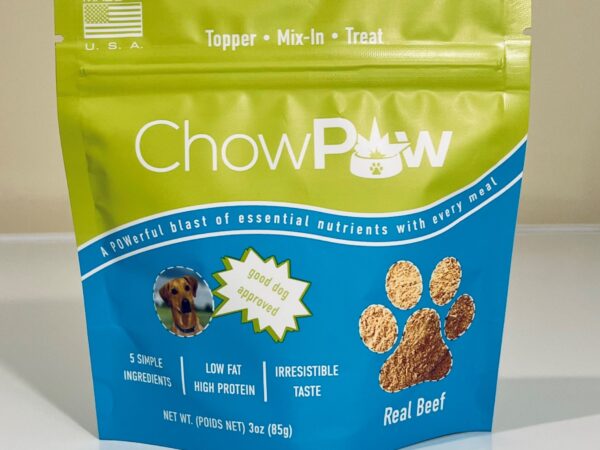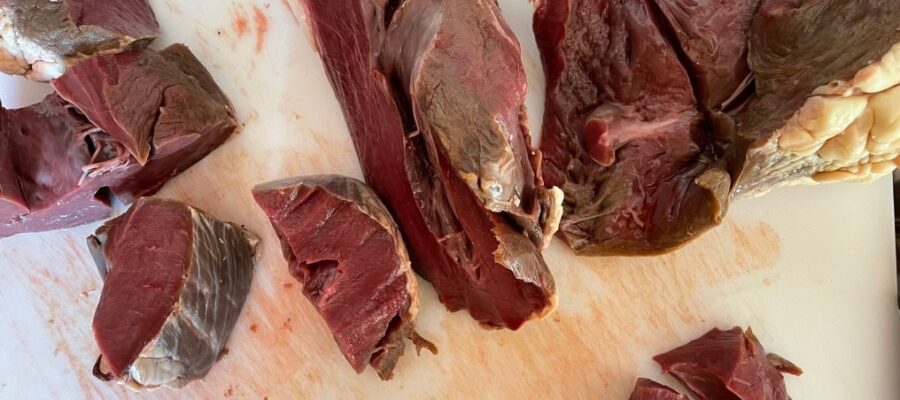
The Power of Dehydration – Preserving Meat for Longevity
Is Dehydrated Meat Good For Dogs?
Let’s face it, everyone has had to throw away expired dog treats or dog food at some point. At Chowpow, we believe longevity is key to sustaining a healthy and balanced diet, that’s why our dog food topper consists of dehydrated meat. In the realm of food preservation, dehydration emerges as a time-tested method for extending the shelf life of perishable items, particularly meat. Let’s delve into the importance of the dehydration process and its role in preserving meat for long-term storage and consumption.
Understanding Dehydration: A Natural Preservation Method
Dehydration, also known as drying, is a centuries-old technique that involves removing moisture from food items to inhibit the growth of bacteria, mold, and yeast. By reducing the water content of meat, dehydration creates an environment where microorganisms cannot thrive, effectively extending its shelf life and preserving its nutritional integrity.
The Significance of Dehydration for Meat Preservation
- Preventing Spoilage: Moisture serves as a breeding ground for bacteria and other pathogens that can cause meat to spoil rapidly. By dehydrating meat, water activity levels decrease significantly, making it inhospitable for microbial growth and spoilage.
- Preserving Nutritional Value: Dehydration preserves the nutritional value of meat by retaining essential vitamins, minerals, and protein content. Unlike other preservation methods that may compromise the nutritional integrity of meat, dehydration maintains its inherent health benefits.
- Enhancing Flavor and Texture: The dehydration process concentrates the flavors of meat, resulting in a more intense and robust taste profile. Additionally, dehydrated meat retains its texture and tenderness, making it a flavorful and satisfying option for consumption.
- Facilitating Storage and Portability: Dehydrated meat boasts a significantly reduced weight and volume compared to its fresh counterpart, making it easier to store and transport. Whether for camping trips, emergency food supplies, or everyday use, dehydrated meat offers convenience without sacrificing quality.
Best Practices for Dehydrating Meat
- Preparation: Begin by selecting high-quality cuts of meat and trimming excess fat to prevent rancidity during dehydration. Slice the meat thinly and uniformly for even drying and optimal results.
- Dehydration Process: Utilize a food dehydrator or oven set to a low temperature to remove moisture from the meat gradually. Monitor the dehydration process closely to ensure that the meat reaches the desired level of dryness without becoming overly brittle.
- Storage: Once dehydrated, store the meat in airtight containers or vacuum-sealed bags to prevent moisture absorption and prolong shelf life. Store in a cool, dry place away from direct sunlight for optimal preservation.
The Benefits Of Dehydrating Meat For Dogs
In addition to its significance for human consumption, the dehydration process holds particular importance for dogs and their dietary needs. Dehydrated meat serves as a natural and nutritious treat or meal to supplement a dog’s diet, offering a rich source of protein, essential amino acids, and vitamins. Many dog owners opt for dehydrated meat as a healthy alternative to commercial treats or as a flavorful addition to their pet’s regular meals. The concentrated flavors and chewy texture of dehydrated meat appeal to dogs’ natural instincts and provide them with a satisfying and wholesome snack option. Moreover, dehydrated meat can be beneficial for dogs with specific dietary sensitivities or allergies, as it typically contains minimal ingredients and avoids common allergens found in commercial pet treats. By incorporating dehydrated meat into their dog’s diet, owners can offer their canine companions a nutritious and enjoyable culinary experience while supporting their overall health and well-being.
In conclusion, the dehydration process plays a crucial role in preserving meat for extended storage and consumption. By removing moisture and inhibiting microbial growth, dehydration ensures that meat remains flavorful, nutritious, and shelf-stable for prolonged periods.






